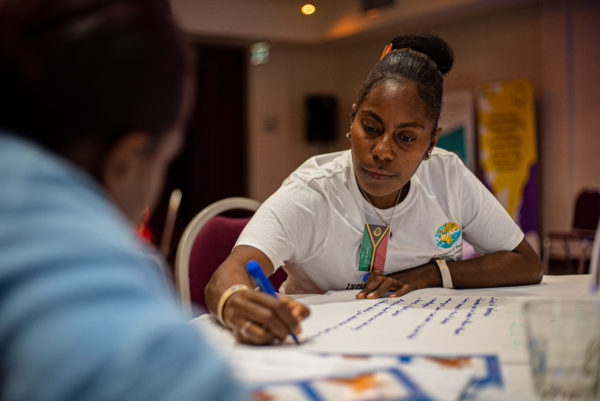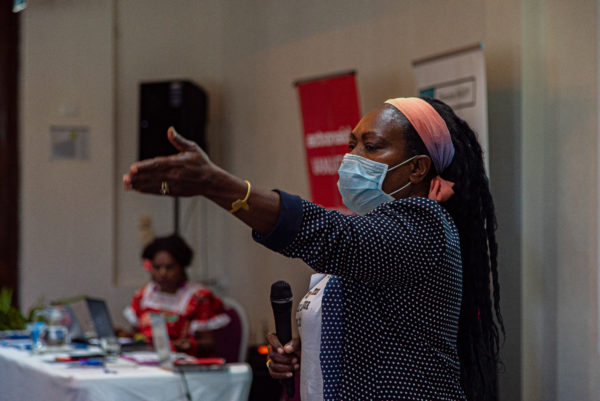WITTT is a network that includes more than 4000 women in 300 communities across Tanna, Eton and Erromango, which is now expanding into Cyclone Harold affected areas of Sanma and Malekula, with ActionAid’s support. It includes WITTT Sunshine, a branch of women with disabilities, who were also involved in the training workshop. This training is putting women at the forefront of the response to COVID-19 and ensuring communities are prepared to prevent infection. It is a localised approach, which is putting power in the hands of women and strengthening their role as leaders in their communities.
Over the past five years, Action Aid has supported the establishment of WITTT to support Ni-Vanuatu women’s leadership in preparing for and responding to disasters and climate change, including creation of community based protection mechanisms. Now, during the coronavirus pandemic, these women are using their skills and networks to deliver vital health information to remote communities across Vanuatu.
Working in partnership with the MoH to deliver training has ensured women will be seen as credible and knowledgeable as they lead efforts to prevent the spread of misinformation about the coronavirus and protect their communities. Already women have begun to roll out training by organising community meetings to explain coronavirus and demonstrate physical distancing and good handwashing practice.
Anne Pakoa, who leads Vanuatu Young Women for Change, ActionAid’s partner organisation, says that giving the responsibility of health messaging to women leaders is an innovative action and one that these women are more than capable of.

“I met these women leaders two years ago and I saw the same women the other day during the ToT training and they’ve come up a long way. They stood up, they spoke confidently, they aired their issues, they spoke about the actions that they are taking at the local level to ensure their communities are safe, how they are able to influence their chiefs, their husbands and the male cohort in their communities to be able to work together to combat COVID-19. It’s amazing.
“If we continue to embed these trainings and make sure that we have these powerful networks of women in all of the six provinces of Vanuatu, I think we are going to take this country very far economically and socially as well,” Anne says.
In times of crisis women take on the burden of care to look after their communities’ most vulnerable members, including children, the elderly, the sick and injured. This experience means women understand their community’s needs, making them effective leaders who promote the interests of the whole community. However, women in Vanuatu have traditionally not been given the chance to lead during times of crisis, compromising the quality of the humanitarian response.
Flora Vano, ActionAid Vanuatu’s Country Program Manager says: “It is really important to have women in leadership because women think of not only themselves but they also think of others. Whatever decision they make, they often put others before themselves.”
ActionAid’s training workshop also had a focus on inclusion of a diverse group of women through WITTT Sunshine, with the specific objective to elevate their leadership and protection during crisis. These women represent a group particularly vulnerable during times of crisis who are commonly excluded from disaster management and response.
Hellen Tamata, a WITTT Sunshine member who uses a wheelchair says: “Women with disabilities know what they want. People without disabilities will not understand our challenges so when we are trained, we will have a voice and we will speak up for ourselves in whatever situation we face and during a disaster we will be prepared.”
With more than 40 years humanitarian experience, Action Aid knows that resourcing local women to lead in times of crisis has long-lasting effects. It meets the immediate needs of the community while supporting gender equality.
“By promoting localisation and shifting the power to women, we are making best use of the fingers we have in the soil to make a lasting impact,” says Flora Vano.
